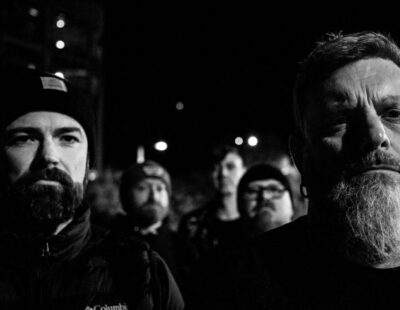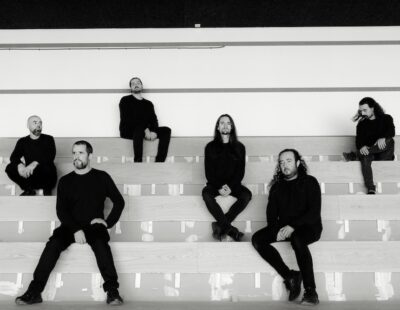
On the surface, Sweden’s AOR/hard rock supergroup The Night Flight Orchestra might not be in your wheelhouse. Traces of Foreigner, Toto, Asia, Loverboy converge at the cowbell with Blue Murder, Giuffria, Giant, and Blue Öyster Cult, among many others, including Swedish prog like Kaipa, Fläsket Brinner, and Samla Mammas Manna. The wide variety of input, influences, and spirit animals isn’t a recipe for acceptance amongst the true and grave-ridden, but if AM Gold, your uncle’s cassette collection, and gateway artists like Journey make cloudy days sunny again, then The Night Flight Orchestra are, on and under the surface, in your wheelhouse. The approach to The Night Flight Orchestra is important, however.
Start with individual songs. Like “Transatlantic Blues” (HERE), then “Living for the Nighttime” (HERE), then “Josephine” (HERE), then “Domino” (HERE), and finally new song “Turn to Miami” (HERE). The sequence of exposure is important for The Night Flight Orchestra, as will be a close friend who shares an affinity for fun, well-played, somewhat corny, scarily catchy AOR/hard rock, written, played, and advanced by current members of Soilwork, Arch Enemy, and Mean Streak.
Decibel caught up with songwriter extraordinaire David Andersson (also of Soilwork fame) to catch a night flight to Yacht Rock City, where he and the rest of The Night Flight Orchestra are playing the cool tracks from new album, Sometimes the World Ain’t Enough. And maybe some choice cuts from Amber Galactic and Skyline Whispers. Ready the Sperrys!
Like all things cheeky did The Night Flight Orchestra start out as a laugh?
David Andersson: I’d say it started out both as a laugh and as something dead serious. When me and Björn (Strid; vocals) got to know each other on my first tour with Soilwork in the U.S. in 2006, we found out that we both loved classic rock, and that there was a huge void in today’s music scene just waiting to be filled. We felt that we needed to start our own band, to create the music that we ourselves wanted to listen to. But we had no commercial ambitions. It was just something that we both felt that we really needed to do. But once we found the right people for the band, which took a while, we also had so much fun together, and everything we do with The Night Flight Orchestra still feels like a vacation. But we still take the music very seriously.
Who would you say were your strongest influences? I hear Foreigner, Toto, Thin Lizzy, Electric Light Orchestra, etc.
David Andersson: All of the above and so much more. We all have very diverse musical tastes, and apart from the obvious stuff like the bands you mentioned, we’re also influenced by lots of prog, fusion, new wave and strange Swedish bands and artists that no one outside of Sweden has ever heard of.
I also hear more obscure hard rock stuff like Zebra, Giuffria, and Blue Murder. How much hard rock, specifically, has infiltrated your songwriting?
David Andersson: Lots of it, I guess. I grew up listening to a lot of that stuff, and things like the first Blue Murder album made a huge impression on me as a kid. I still think that John Sykes is very underrated, both as a guitar player, singer and songwriter. I remember one specific issue of Guitar World that featured both John Sykes and Blue Murder as well as Jake E. Lee who had just done the first Badlands album, and I went out and bought those two LP’s that same week. And yes, we did have access to American guitar magazines in late-’80s Sweden.
Nostalgia has a strong pull. Is The Night Flight Orchestra more than a band servicing nostalgia?
David Andersson: We are definitely not a nostalgia band. Our goal is to take those influences and and rearrange and reassemble them in unique new ways. I have a very hard time with bands and artists who just rip off a whole genre or base their entire sound on one vintage act. Although you can spot lots of influences in our music, I bet you can’t name another band that sounds like The Night Flight Orchestra.
You’re on your fourth album now. What has the journey been like?
David Andersson: It’s been fantastic. Like I mentioned previously, we started this band for our own sake, just wanting to play the music we all loved and having a good time while doing it. Even if we wouldn’t have gotten anywhere commercially, we would still be doing this whenever we had the chance. So getting a serious record deal and being able to take this thing on the road is just a huge bonus that we never expected back when we first started. Even if a few of us are members of fairly well known metal bands, no one really knew what to do with us when we started out. It took a really long time for us to even get a record deal, since everyone in the music industry thought the whole thing was so weird. And I’ll always be grateful that the guys at Coroner Records in Italy gave us our first deal, they’re a bunch of genuine music fans who knew they had everything to lose by releasing our strange concoction of mutant classic rock, but they did it anyway since they’re true to the cause. And after our first two albums Nuclear Blast realized that we might have a point doing what we’re doing, and since then it’s gone to another level. And personally I think what we’re doing is music for the masses. What we’re doing is just the perfect remedy for depressed housewives, anguished teens, frustrated people with midlife crises and metal fans who are getting tired of people recording 8-string guitars in their bedroom at their parents’ house when they’re 36. Our dream is to play stadiums and show people that real musicians, geniune enthusiasm and a good rock show is all that’s necessary to be able to escape reality for a while. Just a bunch of depressed Swedes cheering up under the influence, and hoping to take a few people with us on this journey,
The Swedish Grammy nomination for Amber Galactic must’ve been a nice surprise.
David Andersson: Oh, absolutely. Even if it’s just a jury consisting of industry and media people, it’s always nice to be recognized by the establishment, so to speak. But it’s still nothing compared to the feeling you get when people are sending you messages about how much they love our music, and how our music is going to be the soundtrack for their summer. Have you seen the ending scene from Flashdance with Irene Cara? When she’s passed the test for the dancing school and is running out to her boyfriend waiting by the car in an autumnal New York, and you can tell that this is probably the greatest moment of her life. You (or at least I) tear up and get at few goosebumps, and you remember the grandiosity of your youth, when, even if it was not as grandiose, even tiny emotional events left huge scars on your soul, that you have since have learned to live with.
The band features members of Soilwork and Arch Enemy. How are you managing the priorities between bands?
David Andersson: It’s all about paying the rent, basically. I am an Md, PhD in gastroenterolgy, so I actaully lose money whenever I do music, but I still do it because I love it, however pathetic that may sound. Whereas with Soilwork and Arch Enemy, we do make some money, and most people need that money to pay the rent. So with The Night Flight Orchestra, since we’re still a fairly up-and-coming band, we do whatever offers we get, as long as it doesn’t interfere with us being able to pay the bills. If you want to see what our weekdays look like, you should watch “Bills, Bills, Bills” by Destiny’s Child. Those fantastically gifted women somehow know what it’s like being a Swedish metal musician.
Sounds like songs come easy to The Night Flight Orchestra. “Living for the Nighttime,” “Josephine,” and “Turn to Miami” all feel and sound unforced. How would you describe the songwriting sessions in general?
David Andersson: I write probaly 80-85 percent of the music and lyrics for to The Night Flight Orchestra, although Sebastian [Forslund; guitars] and Björn have written some stellar songs that will always be among our greatest hits. For me personally, songwriting has been something that I’ve done since an early age, and it’s always come really naturally to me. So, unless I start doing class A drugs and lose contact with reality, we will have have a steady inflow of songs coming up in the future.
How would you say Sometimes the World Ain’t Enough differs from its predecessors?
David Andersson: I don’t know if it differs much. It’s more a natural progression and development of what came before.
“Lovers in the Rain” is another great track. And the video is superb too. How did the song and video come together?
David Andersson: Elia Cristofoli, from Verona, Italy, who also did the “Gemini” video, which was fantastic, was chosen to do this one as well. Since the record label, Nuclear Blast, got a bit nervous about featuring too much lesbian love and splatter scenes, we avoided that, but the end result is still pretty amazing. I wrote the song, and it’s all about post-nuclear fragile love, finding the love of your life and knowing that it’s probably all going to be blown to pieces by some sort of mass destruction weapon.
How important is melancholy to The Night Flight Orchestra? Is it something Swedish or something you’re bringing as part of your influences?
David Andersson: Well, we do have this Swedish melancholy that probably has genetic causes, and it’s something that will always be a huge part of whatever we do musically. We do have an in-house melancholy censor in Sharlee, who is always saying no to stuff if it sounds too happy. The melancholy has to be there, and as a Swede, you’re always supposed to remind yourself of death at least once a day, just to remind yourself that you’re alive, and that’s not such a bad thing after all.
The Night Flight Orchestra is almost yacht rock or dock party rock. But there’s a deeper undercurrent lyrically. What are some of the themes on Sometimes the World Ain’t Enough?
David Andersson: There is a concept behind Amber Galactic and Sometimes the World Ain’t Enough, which is a space opera with a feminist agenda. I’ve always dreamed about doing space/sci-fi albums, and even if it’s not a concept album in the true sense of the word, it’s based around an ideological concept with sci-fi and futuristic overtones which I’ll try to explain below. Personally, I’ve always believed that women are the superior gender, and I hope that eventually they, along with the HBTQ (aka LGBT) community, will be the world’s leaders. The book The Spirit Level by Wilkinson and Pickett from ’09, where they show quite convincing studies on how the equality levels in a society is an independent predictive factor when it comes to how that society thrives on a number of levels, sort of confirmed what I’ve been suspecting for a long time. And if you look at universities in Sweden and many other places, these days there are a majority of women on the high-status programs like law, medicine, etc. At the same time, there are powerful forces in the world these days that wants to regress back to a very conservative, intolerant white heterosexual male paradigm. NFO songs have always been written from the melancholic and losing perspective of the male, albeit we still want it to be uplifting and sometimes humorous for the listener, no matter who she or he is. From the second record an onward, we also started adding female voices that have a sort of commentary function. Amber Galactic and Sometimes the World Ain’t Enough is set in a future where humanity is exploring conquering space, but all the space commanders are women, just like the leaders back on Earth, and the men are mostly concerned with providing the ground service and idolizing and falling in love with those superior women that are always slightly out of reach. So, one level these albums are just a classic rock sci-fi themed party albums, and on another level it’s a social commentary describing a utopian future. And a lot of the inspiration comes from my addiction to urban fantasy novels. As for naming the album Sometimes the World Ain’t Enough, we thought it fit nicely with the overall theme. It’s both quite over-the-top, as in sometimes the world, i.e. Earth, isn’t big enough for all that you wan’t to achieve, as well as a nice metaphor for heartbreak, i.e. you’re offering someone the world and it’s still not enough to make her love you. It neatly sums up what this band is about: melancholic Swedes with hubris.
What’s next for The Night Flight Orchestra? An opening slot for Kansas or Bad Company or REO Speedwagon?
David Andersson: No; we’re very much trying to make our own scene happening. Although, it would be extremely flattering to get an opening slot for any of those bands you mentioned: I still think that headline tours are our thing. It’s all about being larger than life and coming across as slightly bigger than you actually are, which is kind of hard to achieve if you get 35 mins in front of another band’s drum riser.
** The Night Flight Orchestra’s new album, Sometimes the World Ain’t Enough, is out now on Nuclear Blast Records. Available as a retro CD, a very retro LP, and that’s about it. Order HERE.






